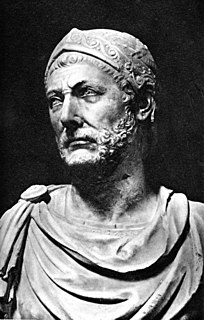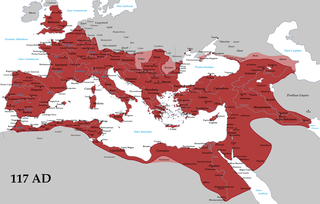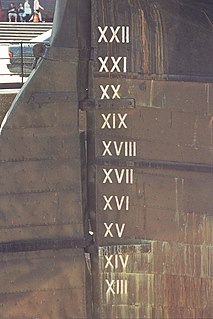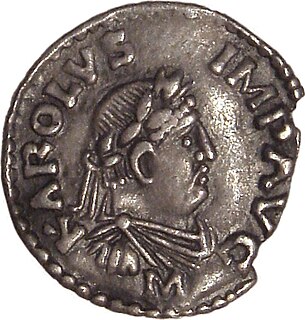Related Research Articles

Caesar Augustus was the first Roman emperor, reigning from 27 BC until his death in AD 14. His status as the founder of the Roman Principate has consolidated an enduring legacy as one of the most effective and controversial leaders in human history. The reign of Augustus initiated an era of relative peace known as the Pax Romana. The Roman world was largely free from large-scale conflict for more than two centuries, despite continuous wars of imperial expansion on the Empire's frontiers and the year-long civil war known as the "Year of the Four Emperors" over the imperial succession.

The Holy Roman Empire was a multi-ethnic complex of territories in Western and Central Europe that developed during the Early Middle Ages and continued until its dissolution in 1806 during the Napoleonic Wars. The largest territory of the empire after 962 was the Kingdom of Germany, though it also included the neighboring Kingdom of Bohemia and Kingdom of Italy, plus numerous other territories, and soon after the Kingdom of Burgundy was added. However, while by the end of the 15th century the Empire was still in theory composed of three major blocks – Italy, Germany, and Burgundy – in practice only the Kingdom of Germany remained, with the Burgundian territories lost to France and the Italian territories, ignored in the Imperial Reform, although formally part of the Empire, were splintered into numerous de facto independent territorial entities. The external borders of the Empire did not change noticeably from the Peace of Westphalia – which acknowledged the exclusion of Switzerland and the Northern Netherlands, and the French protectorate over Alsace – to the dissolution of the Empire. By then, it largely contained only German-speaking territories, plus the Kingdom of Bohemia. At the conclusion of the Napoleonic Wars in 1815, most of the Holy Roman Empire was included in the German Confederation.

The Province of Britain was the area of the island of Great Britain that was governed by the Roman Empire, from 43 to 410 AD. It comprised almost the whole of England and Wales and, for a short period, southern Scotland.

Hercules is the Roman equivalent of the Greek divine hero Heracles, son of Jupiter and the mortal Alcmene. In classical mythology, Hercules is famous for his strength and for his numerous far-ranging adventures.

Hannibal Barca was a Carthaginian general and statesman who commanded Carthage's main forces against the Roman Republic during the Second Punic War. He is widely considered one of the greatest military commanders in world history. His father, Hamilcar Barca, was a leading Carthaginian commander during the First Punic War. His younger brothers were Mago and Hasdrubal, and he was brother-in-law to Hasdrubal the Fair, who also commanded Carthaginian armies.

Gaius Julius Caesar was a Roman general and statesman who played a critical role in the events that led to the demise of the Roman Republic and the rise of the Roman Empire.

Roman Polanski is a Polish-French film director, producer, writer, and actor. Polanski is also a fugitive from the U.S. criminal justice system; he fled the country in 1977 while awaiting sentencing for unlawful intercourse with a minor.

Rome is the capital city and a special comune of Italy, as well as the capital of the Lazio region. The city has been a major human settlement for almost three millennia. With 2,860,009 residents in 1,285 km2 (496.1 sq mi), it is also the country's most populated comune. It is the third most populous city in the European Union by population within city limits. It is the centre of the Metropolitan City of Rome, which has a population of 4,355,725 residents, thus making it the most populous metropolitan city in Italy. Its metropolitan area is the third-most populous within Italy. Rome is located in the central-western portion of the Italian Peninsula, within Lazio (Latium), along the shores of the Tiber. Vatican City is an independent country inside the city boundaries of Rome, the only existing example of a country within a city; for this reason Rome has sometimes been defined as the capital of two states.

The Roman Empire was the post-Republican period of ancient Rome. As a polity it included large territorial holdings around the Mediterranean Sea in Europe, Northern Africa, and Western Asia ruled by emperors. From the accession of Caesar Augustus to the military anarchy of the 3rd century, it was a principate with Italy as metropole of the provinces and the city of Rome as sole capital. After the military crisis, the empire was ruled by multiple emperors who shared rule over the Western Roman Empire and over the Eastern Roman Empire. Rome remained the nominal capital of both parts until 476 AD, when the imperial insignia were sent to Constantinople, following the capture of Ravenna by the barbarians of Odoacer and the subsequent deposition of Romulus Augustulus. The fall of the Western Roman Empire to Germanic kings, along with the hellenization of the Eastern Roman Empire into the Byzantine Empire, conventionally marks the end of Ancient Rome and the beginning of the Middle Ages.

Roman numerals are a numeral system that originated in ancient Rome and remained the usual way of writing numbers throughout Europe well into the Late Middle Ages. Numbers in this system are represented by combinations of letters from the Latin alphabet. Modern usage employs seven symbols, each with a fixed integer value:

The Roman Republic was the era of classical Roman civilization, led by the Roman people, beginning with the overthrow of the Roman Kingdom, traditionally dated to 509 BC, and ending in 27 BC with the establishment of the Roman Empire. During this period, Rome's control expanded from the city's immediate surroundings to hegemony over the entire Mediterranean world.

Gaul was a region of Western Europe first described by the Romans. It was inhabited by Celtic tribes, encompassing present day France, Luxembourg, Belgium, most of Switzerland, and parts of Northern Italy, the Netherlands, and Germany, particularly the west bank of the Rhine. It covered an area of 494,000 km2 (191,000 sq mi). According to Julius Caesar, Gaul was divided into three parts: Gallia Celtica, Belgica, and Aquitania. Archaeologically, the Gauls were bearers of the La Tène culture, which extended across all of Gaul, as well as east to Raetia, Noricum, Pannonia, and southwestern Germania during the 5th to 1st centuries BC. During the 2nd and 1st centuries BC, Gaul fell under Roman rule: Gallia Cisalpina was conquered in 203 BC and Gallia Narbonensis in 123 BC. Gaul was invaded after 120 BC by the Cimbri and the Teutons, who were in turn defeated by the Romans by 103 BC. Julius Caesar finally subdued the remaining parts of Gaul in his campaigns of 58 to 51 BC.
Hepburn romanization is the most widely-used system of romanization for the Japanese language. Originally published in 1867 by American missionary James Curtis Hepburn as the standard used in the first edition of his Japanese–English dictionary, the system is defined from other romanization methods by its use of English orthography to phonetically transcribe sounds: for example, the syllable [ɕi] is written as shi and [tɕa] is written as cha, more accurately reflecting their spellings in English.

The Holy Roman Emperor, originally and officially the Emperor of the Romans during the middle ages, and also known as the German-Roman Emperor since the early modern period, was the ruler and head of state of the Holy Roman Empire. The Empire was considered by the Roman Catholic Church to be the only legal successor of the Roman Empire during the Middle Ages and the early modern period. The title was held in conjunction with the title of King of Italy from the 8th to the 16th century, and, almost without interruption, with the title of King of Germany throughout the 12th to 18th centuries.

Cleopatra VII Philopator was the last active ruler of the Ptolemaic Kingdom of Egypt. As a member of the Ptolemaic dynasty, she was a descendant of its founder Ptolemy I Soter, a Macedonian Greek general and companion of Alexander the Great. After the death of Cleopatra, Egypt became a province of the Roman Empire, marking the end of the second to last Hellenistic state and the age that had lasted since the reign of Alexander. Her native language was Koine Greek, and she was the only Ptolemaic ruler to learn the Egyptian language.

Saturnalia was an ancient Roman festival and holiday in honour of the god Saturn, held on 17 December of the Julian calendar and later expanded with festivities through to 25 December. The holiday was celebrated with a sacrifice at the Temple of Saturn, in the Roman Forum, and a public banquet, followed by private gift-giving, continual partying, and a carnival atmosphere that overturned Roman social norms: gambling was permitted, and masters provided table service for their slaves as it was seen as a time of liberty for both slaves and freedmen alike. A common custom was the election of a "King of the Saturnalia", who would give orders to people, which were to be followed and preside over the merrymaking. The gifts exchanged were usually gag gifts or small figurines made of wax or pottery known as sigillaria. The poet Catullus called it "the best of days".

Classical antiquity is the period of cultural history between the 8th century BC and the 6th century AD centered on the Mediterranean Sea, comprising the interlocking civilizations of ancient Greece and ancient Rome known as the Greco-Roman world. It is the period in which both Greek and Roman societies flourished and wielded great influence throughout much of Europe, Northern Africa, and West Asia.

In historiography, ancient Rome is Roman civilization from the founding of the Italian city of Rome in the 8th century BC to the collapse of the Western Roman Empire in the 5th century AD, encompassing the Roman Kingdom, Roman Republic and Roman Empire until the fall of the western empire. The civilisation began as an Italic settlement in the Italian Peninsula, traditionally dated to 753 BC, that grew into the city of Rome and which subsequently gave its name to the empire over which it ruled and to the widespread civilisation the empire developed. The civilization was led and ruled by the Romans, alternately considered an ethnic group or a nationality. The Roman Empire expanded to become one of the largest empires in the ancient world, still ruled from the city, with an estimated 50 to 90 million inhabitants and covering 5 million square kilometres at its height in AD 117.

The fall of the Western Roman Empire was the process of decline in the Western Roman Empire in which the Empire failed to enforce its rule, and its vast territory was divided into several successor polities. The Roman Empire lost the strengths that had allowed it to exercise effective control over its Western provinces; modern historians posit factors including the effectiveness and numbers of the army, the health and numbers of the Roman population, the strength of the economy, the competence of the Emperors, the internal struggles for power, the religious changes of the period, and the efficiency of the civil administration. Increasing pressure from invading barbarians outside Roman culture also contributed greatly to the collapse. Climate change has been suggested as a driver of the changes in some of these factors. The reasons for the collapse are major subjects of the historiography of the ancient world and they inform much modern discourse on state failure.

Leati Joseph "Joe" Anoa'i is an American professional wrestler, actor, and former professional gridiron football player. He is currently signed to WWE, where he performs on the SmackDown brand under the ring name Roman Reigns, and he is the current WWE Universal Champion in his second reign. He is part of the Anoa'i wrestling family, which also includes his father Sika Anoaʻi, brother Rosey, and cousins Yokozuna, Rikishi, Umaga, and The Tonga Kid.
References
- ↑ Smith, Dictionary of Greek and Roman Geography (1857), s.v. Ligures
- ↑ J. Murray, The Academy (1880), vol. 18, p. 32.
| This article about ethnicity or ethnology is a stub. You can help Wikipedia by expanding it. |